For This Pella Corp. Leader, Manufacturing Is an Easy Sell

When JaNette Barnett, vice president of field sales at Pella Corporation, is asked why she has spent nearly 30 years of her career in manufacturing, the answer comes easily. “I have always been drawn to the home improvement space, so it’s no surprise that my manufacturing experience has been centered in that sector—from cabinetry to lightbulbs, to plumbing to paint, and now windows.”
- “What makes this [sector] interesting to me is it delights our end consumer. It puts a smile on their face when they can transform their spaces in ways that make them feel at home.”
Barnett channels this joy into her efforts to modernize Pella’s sales team, a track record that won her recognition as part of the 2025 Women MAKE America Awards. Created by the Manufacturing Institute, the NAM’s workforce development and education affiliate, the awards honor 130 individuals who have achieved excellence in the manufacturing industry.
Barnett and the other honorees, selected by a panel of peers, will be celebrated at the Awards gala in Washington, D.C., on April 24, but we caught up with her earlier about her decades-long experience in the industry and advice for young people just starting out.
Her achievements: Barnett has been a game-changing leader for Pella’s field sales team, delivering a 30% year-over-year sales increase in 2024.
- Thanks to her extensive experience at previous companies, she has reconfigured its sales territories, overseen an expansion of the company’s sales team and improved its compensation structure—all of which has led to impressive engagement levels among Pella’s field sales personnel.
- Beyond that, Barnett is a highly respected mentor of young professionals at Pella and runs a foundation she named for her grandmother, the Betty Jefferson Memorial Fund, to support the education of Black, inner-city young people just as her grandmother did.
How it all began: As Barnett tells it, she fell into manufacturing two decades ago while looking for a job in marketing. She accepted a job in sales, but when she arrived, she found she’d been assigned to the production scheduling department instead—a job that involved walking the factory floor in steel-toed boots.
- “It wasn’t what I signed up for, but it was the best pivot ever,” said Barnett. “It put me in the heart of manufacturing—and as a sales and marketing leader, it gave me a different perspective on how products are made.”
Gaining insight: Her experience on the factory floor has informed her work ever since, even after she moved on to the corporate side of manufacturing. Today, she emphasizes that her holistic view of manufacturing impacts how she thinks about her sales work at Pella.
- “I truly believe that manufacturing is the heartbeat of the organization,” said Barnett. “Too often, that gets lost from a sales and marketing lens. We don’t always have a clear sense of the people behind the product getting made.”
Mentoring others: Barnett emphasized the importance of mentoring in introducing more people to the manufacturing industry. Especially at a time when manufacturing faces a significant employment gap—with more than 450,000 job openings today and an estimated 3.8 million positions needing to be filled by 2033—it is crucial to reach individuals who might not otherwise consider a career in the industry, she pointed out.
- “I believe mentoring is a form of paying it forward and bringing others along,” said Barnett. “There’s a need to bring new and fresh ideas to these places. And if people have aspirations to be in leadership, it’s my honor to help mentor them and help them understand that they can do the things they set their sights on.”
The last word: “My message has always been: You’re needed,” said Barnett. “We need you in this space. We need everything you can bring to the table.”
The Innovators Quest Gets Students Excited About Manufacturing
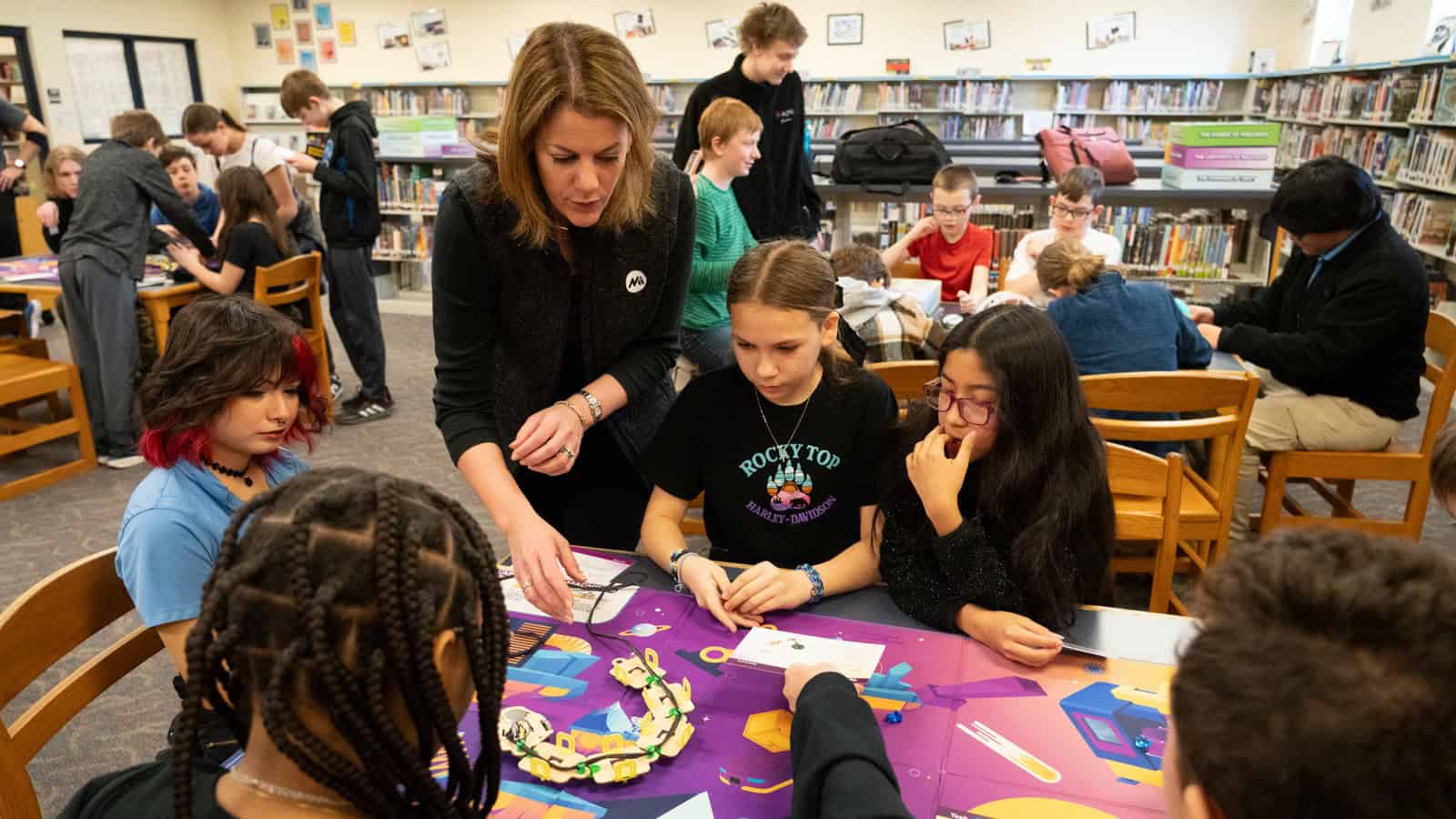
Manufacturers have a new opportunity to connect with students and encourage them to explore careers in manufacturing. The Manufacturing Institute (the NAM’s workforce development and education affiliate) has developed a gamified experience called Innovators Quest, specially designed to introduce students to manufacturing-related skills in a fun-filled format.
The experience is made up of four realms in a board game format with hands-on building challenges. As they seek to recover the “Crystal of Innovation,” students in grades 4 through 9 can try their hands at 3D printing, robotics and other crucial skills. Manufacturers can sponsor Innovators Quest sets, which they can take to schools, afterschool programs, local community events, Boys and Girls Clubs and more.
The quest: The conceit of the game is that the aforementioned crystal has fractured, and the students must fix it by completing four challenges in whichever order they choose.
- While the students play collaboratively, completing challenges together, they all take on the role of different innovator characters who have different mixes of manufacturing-related strengths, including “analytical, visual, intuitive, strategic and extroverted.”
- “We want all students to see themselves in at least one of these characters,” MI Director of Student Engagement Jen White explained to us.
The challenges: The four challenges ingeniously explore manufacturing concepts while still entertaining the participants, as the writer of this article can vouch.
- One challenge instructs students to build paper airplanes. But the lesson isn’t just about building—it’s about perfecting and testing your products. The players must make 10 airplanes following two separate designs, then put together an electric plane launcher. Finally, they test their airplanes to see if they sail the necessary 6 feet to “fly away” with a handful of the crystal fragments. Skills and concepts learned: collaboration, iteration, precision, electromechanical building, aerodynamics, following directions and testing.
- A second challenge draws on the principles of additive manufacturing. Players are asked to use 3D pens (which dispense a line of malleable plastic that can be made into shapes or figures) to construct the pieces of a bridge over which the crystal fragments must be transported. Skills and concepts learned: additive manufacturing, precision, following a blueprint, welding parts together, collaborating on different pieces and structural integrity.
We won’t spoil the other two realms, but they involve a similar blend of fun challenges and manufacturing skills exploration—including the construction of a small robotic toy and a test of deductive reasoning.
The bottom line: “Innovators Quest was developed based on proven approaches to empower manufacturing employers to engage students early and often,” said MI President and Executive Director Carolyn Lee. “By sparking their interest in skills needed in modern manufacturing, this student engagement tool illustrates the limitless possibilities of the many careers in our industry. The time to invest in our future workforce is now.”
- “Innovators Quest is an important initiative that will provide students with early knowledge about the variety of opportunities for a career in manufacturing and highlights the value of teamwork, collaboration and communication in the production environment,” said American Honda Motor Co. Executive Vice President Bob Nelson. “We’re proud to continue our partnership with the Manufacturing Institute to build that future workforce.”
Learn more: Learn more about Innovators Quest and how your company can sponsor a kit to build manufacturing career awareness in your community. To secure a sponsorship before the 2025–2026 school year begins, contact [email protected].
Women MAKE Awards to Honor Outstanding Women in Manufacturing
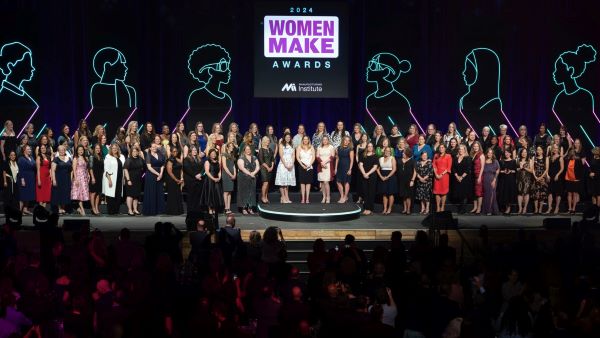
The Manufacturing Institute—the workforce development and education affiliate of the NAM—has announced the recipients of the 2025 Women MAKE Awards, honoring some of the most impressive and inspiring women in the manufacturing industry today.
The awards, which will take place in Washington, D.C., on April 24, will highlight 130 individuals who have demonstrated excellence and leadership in their careers across all levels of the manufacturing industry.
The challenge: The manufacturing industry faces a significant talent gap—with more than 400,000 job openings and an estimated 3.8 million positions needing to be filled by 2033.
- Women make up about half of the U.S. labor force, but less than one-third of the manufacturing workforce. Boosting the numbers of women who choose a career in modern manufacturing is essential to closing this gap—and the honorees of the Women MAKE Awards are leading the way.
The initiative: The MI’s Women MAKE America Initiative strengthens the modern manufacturing workforce by elevating and highlighting the women leading the industry at every level—from the shop floor to the C-suite—in order to inspire the next generation and help close the talent gap in the industry.
The awards: Each year, 100 Honorees and 30 Emerging Leaders are chosen from the thousands of nominations submitted to the MI by their peers for making significant contributions to their companies, communities and efforts to cultivate the next generation of skilled talent. Since its inception, the Women MAKE Awards have recognized about 1,700 outstanding individuals.
The MI says: “Every year, more women are finding opportunity and breaking barriers in manufacturing,” said MI President and Executive Director Carolyn Lee. “By elevating these outstanding women for their success, we are showing young women—and everyone else—that manufacturing is a rewarding industry with unlimited potential.”
- “At a time when there is such high demand for talent in our sector, these extraordinary women demonstrate the impactful careers that are available. By elevating role models who are paying it forward, the Women MAKE Awards strengthen the future of the industry by inspiring the next generation.”
Manufacturing leaders say: “With hundreds of thousands of open jobs in manufacturing, it has never been more critical to attract and retain top talent,” said Toyota Senior Vice President of Electric Vehicle Supply Susan Elkington.
- “This year’s Women MAKE Honorees and Emerging Leaders are breaking barriers, leading with innovation and proving there is no limit to what they can achieve in our industry. By amplifying their stories and accomplishments, we inspire others to step into manufacturing and shape its future.”
Learn more: Read about the awardees and learn more about the awards gala.
How FAME Supercharged a Mom’s Manufacturing Career
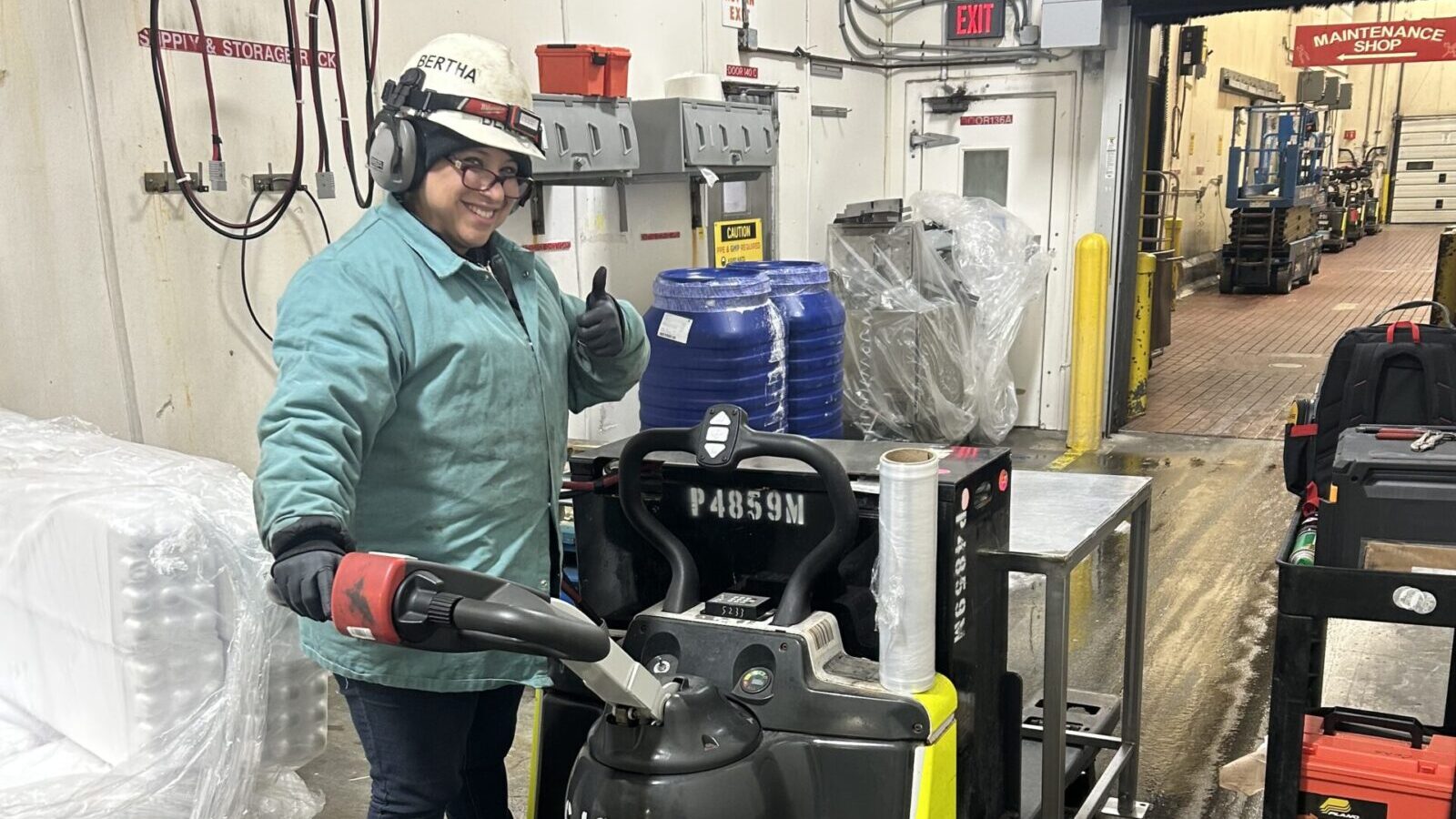
Bertha Ostiguin thought for years about going back to school. She had left the workforce to be a stay-at-home mom, and when she started working in production at H-E-B, she was still raising two boys at home. The idea of working part time while also studying and raising her kids felt daunting. But about six years into her manufacturing career at H-E-B, she joined the Advanced Manufacturing Technician program through TX FAME – Alamo in Alamo, Texas—more than 25 years after she was last in school.
“Honestly, I was scared that I wasn’t going to be able to make it,” said Ostiguin. “But it has been one of the best choices I’ve made. … I love it, I love what it does, and I cannot talk enough about it.”
The program: Founded in 2010 by Toyota and operated today by the Manufacturing Institute—the workforce development and education affiliate of the NAM—FAME aims to help students become highly skilled, sought-after workers capable of meeting the needs and challenges of the modern manufacturing sector.
- It provides current and aspiring workers with on-the-job training and classroom education, leading to an associate’s degree and the FAME certificate.
The opportunity: While Ostiguin was already several years into a manufacturing career, her experience at FAME has helped to expand her skillset, allowing her to advance her career at H-E-B and set herself up for greater success throughout her working life.
The benefits: In addition to teaching specific qualifications and in-demand technical skills, FAME helps to provide participants with the soft skills and professional behaviors they’ll need to succeed in today’s workforce, like communication. According to Ostiguin, it made her a better mentor to other people at work.
- “As I’m learning these things, I’m also teaching the young guys,” said Ostiguin. “And I would tell them, from my experience, why all this makes a difference.”
A model for others: In an industry that often has more men than women, Ostiguin saw early on that she was setting an example for others. She promised herself that she was going to finish the program—not just for herself and her sons, but for other women in manufacturing who might follow her lead. Ultimately, Ostiguin became the first woman from H-E-B to complete the FAME program, at the top of her class.
- “I started seeing the impact it was having for females, and how it wasn’t just about me anymore—it was about the bigger picture,” said Ostiguin.
A word of advice: Ostiguin is proud of what she has accomplished and encourages others to take advantage of opportunities to increase their knowledge and improve their skills.
- “Absorb as much as you can, and ask the questions that you have to ask,” said Ostiguin. “That’s the only way we’re all going to learn.”
From the MI: “FAME isn’t just transforming careers—it’s strengthening companies,” said MI President and Executive Director Carolyn Lee. “Bertha’s journey shows how investing in workforce development creates highly skilled employees who bring immediate value to their employers and themselves, creating a winning combination for long-term success.”
The State of the Manufacturing Workforce in 2025
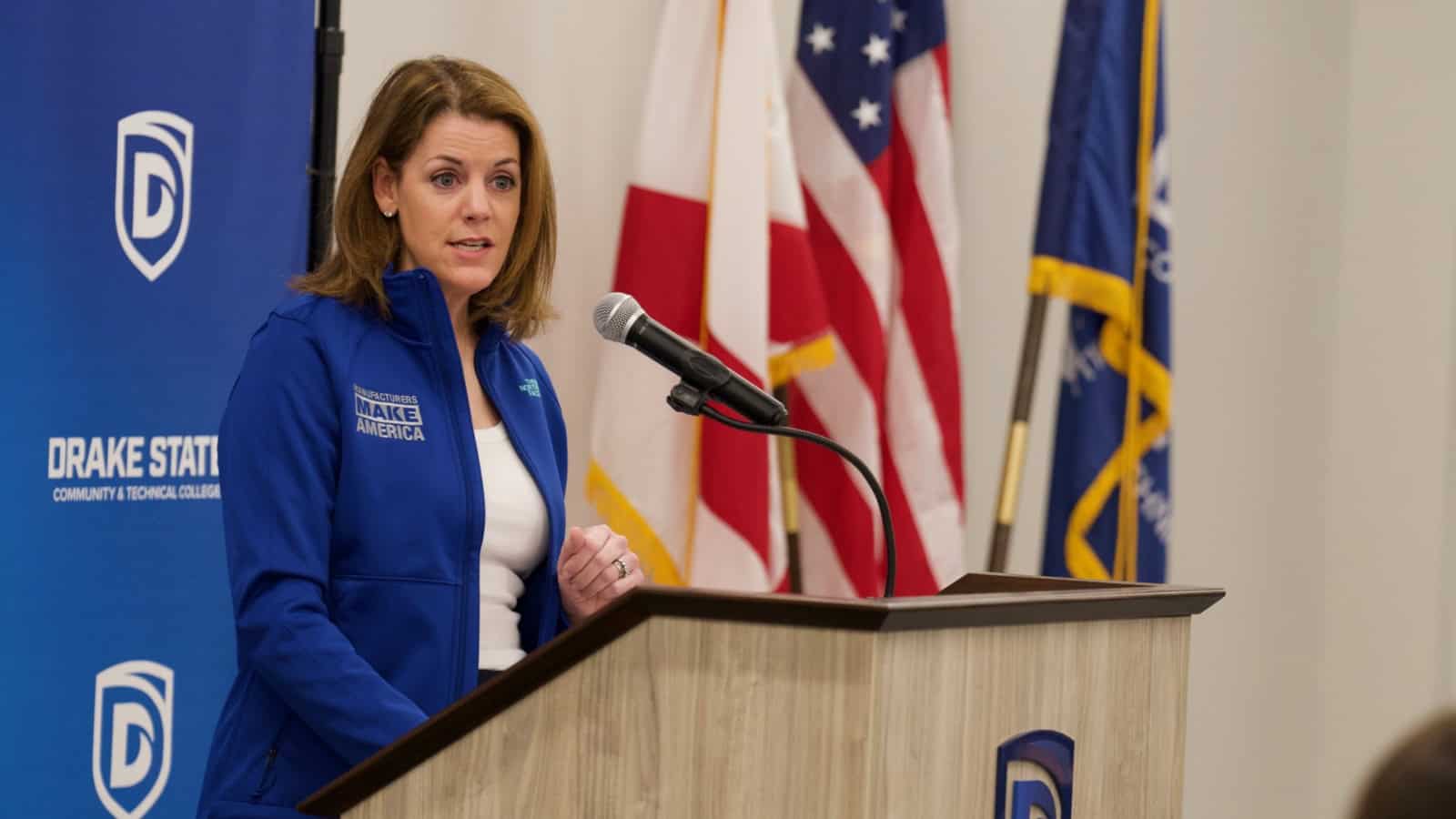
The NAM kept up a breakneck pace on the third day of its 2025 Competing to Win Tour, with the Manufacturing Institute delivering the first-ever State of the Manufacturing Workforce Address at Drake State Community and Technical College in Huntsville, Alabama, before an audience of students, faculty, manufacturers and local and state officials.
Opportunity—for all: Taking the stage to give the MI’s assessment of the manufacturing worker base in 2025, Carolyn Lee, president of the Manufacturing Institute, the NAM’s 501(c)3 workforce development and education affiliate, homed in on the theme of opportunity.
- “Manufacturing is not just about innovation and economic growth; it’s about opportunity. It’s about ensuring that every community, every aspiring maker, builder and creator—no matter their background—can have access to the skills, training and careers that will define the future.”
- But because the industry stands at a crossroads, part of that opportunity today is to help manufacturing maintain its momentum, Lee said, echoing a theme of NAM President and CEO Jay Timmons’ 2025 State of Manufacturing Address on Tuesday.
Finest hours ahead: Lee was joined at the event by Rep. Dale Strong (R-AL), who spoke about the strength of Alabama’s manufacturing sector.
- “I think we’ve proven here in Alabama, and North Alabama especially, advanced manufacturing is part of our DNA,” he said. “You look at the jobs that we’ve brought in the last 10 or 15 years. You start with GE Aviation, Polaris, Toyota Motor Manufacturing, Mazda Toyota. We’ve proven that the Alabama workforce has the ability. I think our finest hours are still ahead.”
A world-changing job: Timmons echoed that sentiment. “You’re stepping into one of the most important and innovative fields in the world,” he told the Drake State students.
- “The products, the materials, the technologies that you will help create, they won’t just be used in your hometown or even all across our country. They’re going to help change economies … They’re going to strengthen the very foundation of America’s security and prosperity.”
A shortfall: But manufacturing today faces an immense challenge, Lee told the crowd: “a structural workforce deficit.”
- “[I]f we don’t act boldly, the U.S. faces a shortfall of 1.9 million manufacturing workers by 2033; 3.8 million positions will open up, but nearly half could go unfilled. That’s not just a workforce issue—it’s an economic and national security issue.”
- That’s despite the average annual earnings—including pay and benefits—for a manufacturing employee coming in at more than $102,000.
- The dearth of workers in the sector is driven by both retirements and growth.
How to overcome it: “[W]e have to inspire more Americans to see themselves in manufacturing,” Lee said. “That starts early, with programs that spark curiosity and excitement for careers in our industry. And when I say early, I mean as young as 9 or 10 years old—because today’s 4th graders will graduate in 2033 and may be our future team members.”
- To this end, the MI partners each year with manufacturers on MFG Day, which kicks off a full month of events at which companies show young people, students and job seekers what a modern manufacturing career looks like.
- The MI, with the support of Honda, has also created a new interactive experience to interest youngsters in the industry: “Innovators Quest,” which combines elements of board games and popular fantasy and storytelling activities.
The FAME factor: Under the MI’s auspices, the Federation for Advanced Manufacturing Education USA, a workforce program started by Toyota in 2010 and entrusted to the MI in 2019, has grown considerably. (Drake State is home to one of the public–private partnership’s newest chapters.)
- FAME participants attend classes and earn while they learn in hands-on apprenticeships with manufacturers.
- The program—in which a participant can easily earn more than $30,000 over two years—has become “the gold standard for how employers, educators and communities should work together” on manufacturing workforce training, Lee said.
Other efforts: The MI helps manufacturers actively recruit groups often overlooked in manufacturing hiring initiatives: veterans, women and previously incarcerated individuals.
- The Heroes MAKE America program helps connect former members of the military with manufacturing jobs. Walmart provides crucial funding to the program; in 2022, it gave a six-figure grant to fund the development of a model that translates skills acquired in the military to ones recognized by manufacturing employers.
- The Women MAKE America Initiative is the nation’s premier program aimed at closing the gender gap in the sector.
- “The MI is helping manufacturers develop second chance hiring strategies, recognizing that talent is talent—and potential shouldn’t be wasted,” Lee said to the audience.
Working together: “As we look ahead, manufacturers, educators and policymakers must work together to strengthen our talent pipeline,” Lee and Drake State Community and Technical College President Dr. Patricia G. Sims wrote in a Thursday op-ed for the Alabama Political Reporter.
Manufacturing in Alabama: On Thursday afternoon, the NAM and MI contingent continued its manufacturing-facility tour, visiting Toyota Motor Manufacturing Alabama and Bruderer Machinery—both in Huntsville—and Milo’s Tea Company in Bessemer.
- “I plan on making my career here,” said Drew, a 2024 FAME graduate, during a discussion before a tour of the shop floor. Drew is now working as a maintenance team member at Toyota Alabama. The talk focused on how the FAME program prepared participants for a rewarding career in auto manufacturing. Toyota Alabama—2,400-plus team members strong—has created 10,000 jobs in the state.
- Lee visited Bruderer Machinery, a leading manufacturer of high-precision stamping presses that provides solutions for the automotive, aerospace and electronics industries. Bruderer is also a key supporter of the FAME apprenticeship model.
- Timmons and the rest of the NAM team finished the day at Milo’s Tea, the fastest-growing tea company in America. The family-owned business, founded by CEO Tricia Wallwork’s grandparents Milo and Bea Carlton, has won 40% of the refrigerated iced tea market share in the U.S. “This reminded me of my grandmother’s iced tea,” said Timmons. “You could see how special Milo’s is by just walking the shop floor and seeing the smiles and camaraderie.”
The New American Model for Manufacturing Skills Training
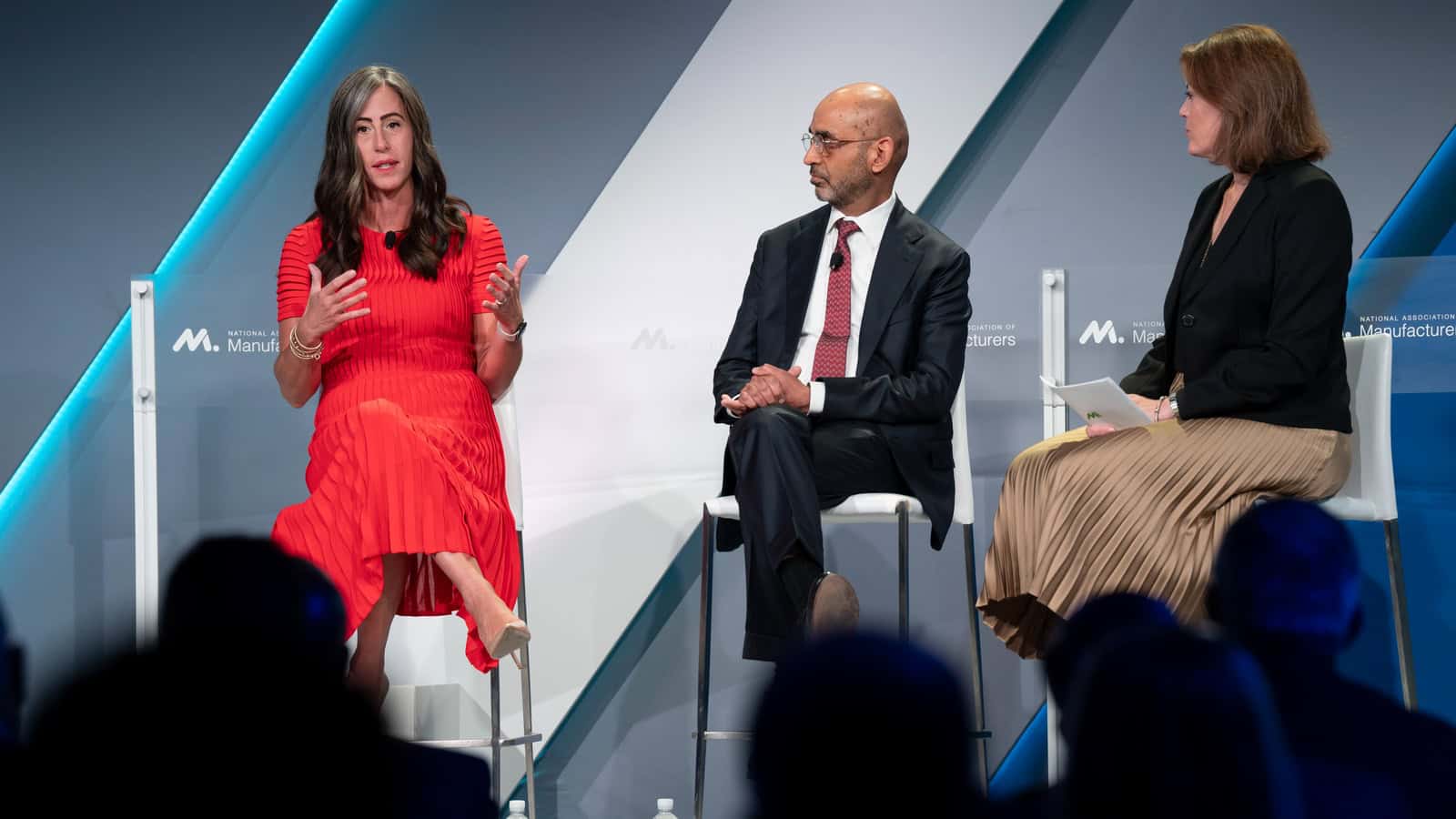
FAME USA is revitalizing the manufacturing workforce with its global-best model of on-the-job training combined with classroom education.
Created in 2010 by Toyota, the program was entrusted to the Manufacturing Institute, the NAM’s workforce development and education affiliate, in 2019. Since then, it has grown enormously, almost doubling in size under the MI’s stewardship.
The past five years: FAME has scaled to more than 45 chapters across 16 states since the MI took over stewardship of the initiative—up from 20 chapters in 9 states. Employer support has grown, too, from 220 manufacturers to nearly 500 today.
- As a result of this growth, FAME boasts more than 1,300 enrolled students, 2,200 graduates and an impressive 90% employment rate upon graduation.
- And there’s much more coming soon: FAME plans to add eight more chapters by the beginning of the 2026 school year.
Working with manufacturers: FAME offers two options for manufacturers looking for skilled workers.
- They can join an existing FAME chapter and benefit from the established employer collaborative. Or in locations where FAME doesn’t already have a presence or where the companies are building new facilities or undertaking large expansions, they can initiate a new FAME chapter to meet their greater need for talent.
General Mills: The food manufacturer was searching for more skilled workers for its Hannibal, Missouri, facility when it learned of FAME. In 2024, General Mills joined the Great River chapter in Illinois, which crosses state lines into Missouri, and committed to sponsoring five students.
- “We want the best talent at our manufacturing facilities, and we know that there’s tremendous talent in our communities. Partnering with FAME allows us to harness the talent in our local communities and get candidates excited about building a career with General Mills,” said Becky Crane, vice president, manufacturing & engineering at General Mills, during a recent panel discussion highlighting FAME.
Novelis: The leading producer of flat-rolled aluminum products and the world’s largest recycler of aluminum first partnered with FAME in 2015 through joint venture Logan Aluminum in Kentucky, as part of the SKY FAME chapter.
- “FAME provides an excellent forum for manufacturing companies in the same region to work together on providing the necessary exposure and skills to our future workforce,” said Dev Ahuja, executive vice president and chief financial officer at Novelis.
- Approximately 40 employees at Novelis are FAME graduates, and the company expects this number to grow as it expands participation across states.
- Novelis has also found success with FAME during greenfield projects. The Novelis plant in Guthrie, Kentucky, began partnering with the HOPFAME chapter in 2018 during construction of its new facility, and the company is now a founding employer of the FAME chapter in Bay Minette, Alabama, where it is constructing an aluminum plant that will create up to 1,000 jobs.
The bottom line: “FAME is not just a training program; it’s a transformative solution for employers looking to cultivate a skilled workforce that meets their specific needs. By engaging with FAME, companies can tap into local talent, foster economic growth and build a sustainable pipeline of skilled workers,” said MI President and Executive Director Carolyn Lee.
- “We encourage employers to join this collaborative effort—together, we can empower our communities and ensure the future of manufacturing is in America.”
Get involved: Learn more here about FAME and how you can tap into this global-best training resource. And don’t forget to follow FAME USA on LinkedIn.
How Johnson & Johnson Supports the Military Community
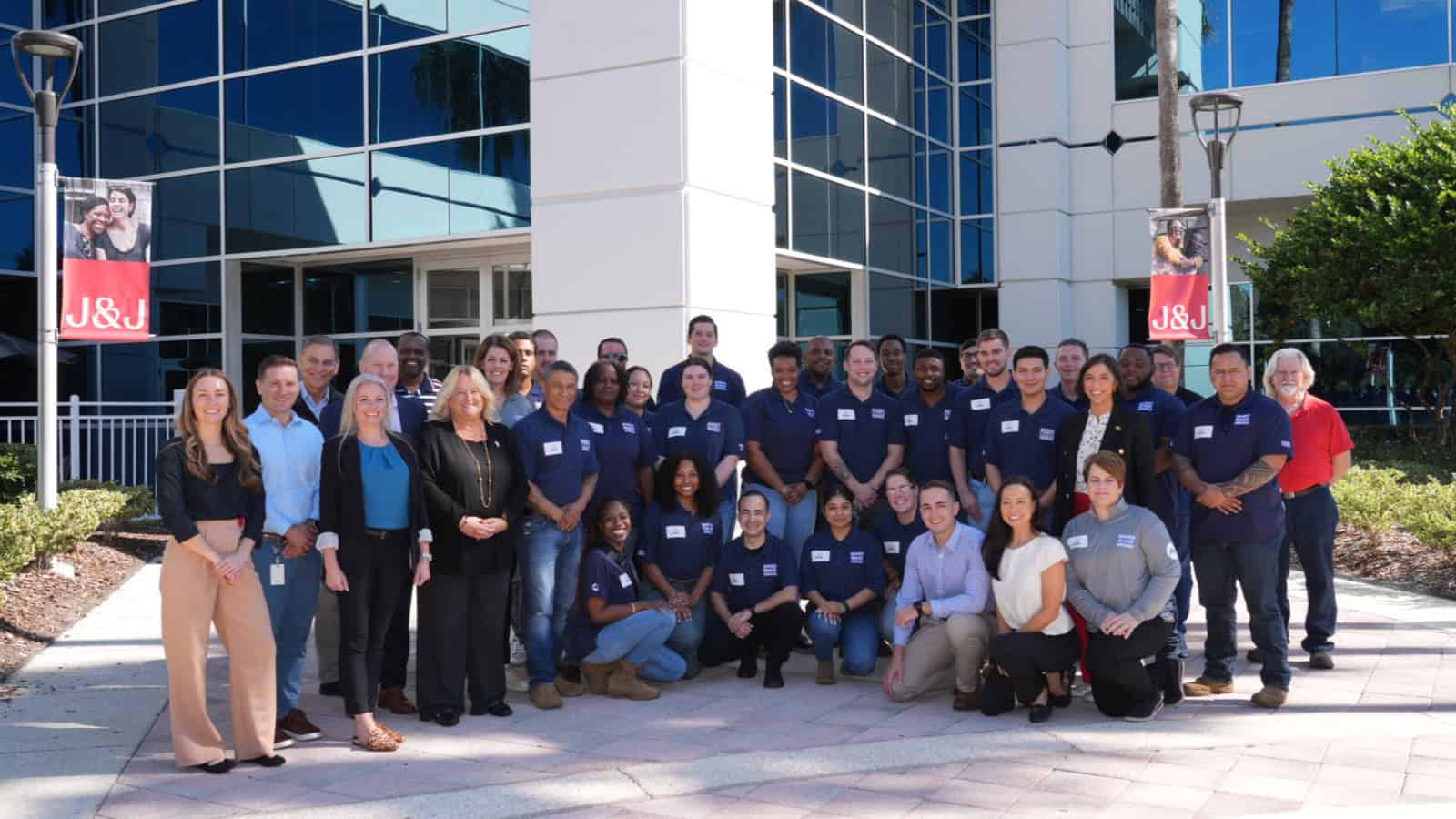
For more than a century, Johnson & Johnson has been a steadfast supporter of military service members. Today, one of the ways Johnson & Johnson fulfills this mission is by partnering with the Manufacturing Institute’s Heroes MAKE America initiative, which connects members of the military community with rewarding careers in manufacturing.
Both Johnson & Johnson and HMA firmly believe that military experience is invaluable for manufacturing careers. Veterans often have advanced problem-solving abilities, leadership skills and a strong work ethic—qualities that are essential in the fast-paced, dynamic environment of manufacturing.
The partnership: Since 2021, Johnson & Johnson has been the official health care sponsor of HMA. With their support, the initiative has continued to expand in-person and virtual training programs and helped more service members transition into rewarding manufacturing careers.
- Johnson & Johnson is a frequent host of facility tours for HMA students, as well as an active participant in Heroes Connect. These events provide military members with valuable insights into the manufacturing sector and allow them to connect with potential employers.
- The company also hires HMA graduates itself, employing three so far at its facilities.
Bringing careers into focus: On Nov. 15, Johnson & Johnson hosted 22 HMA participants from Fort Stewart in Georgia at its Vision Care site in Jacksonville, Florida.
- Johnson & Johnson Executive Vice President, Chief Technical Operations & Risk Officer and NAM Board Chair Kathy Wengel, MI President and Executive Director Carolyn Lee and NAM President and CEO Jay Timmons also joined the tour. (The MI is the workforce development and education affiliate of the NAM.)
- Wengel, Lee and Timmons participated in group discussions with HMA participants and held a fireside chat where they discussed their careers in manufacturing and Johnson & Johnson’s commitment to military hiring. They also gave advice to the HMA participants about working in the industry.
- “Veterans embody resilience, adaptability and dedication—qualities that are at the heart of manufacturing excellence,” said Wengel. “At Johnson & Johnson, we’re honored to work alongside Heroes MAKE America to support veterans in their transition to civilian careers, providing them with opportunities to build rewarding futures in manufacturing.”
From the MI: “Johnson & Johnson’s partnership has been crucial to our efforts to connect the military community with meaningful career opportunities in manufacturing,” said Lee. “They are an example of what it means to invest in veterans and support their transition into civilian careers.”
Get involved: To learn more about HMA and its incredible pool of talent, attend a virtual information session or email [email protected].
MFG Day 2024: The MI Goes to Kansas
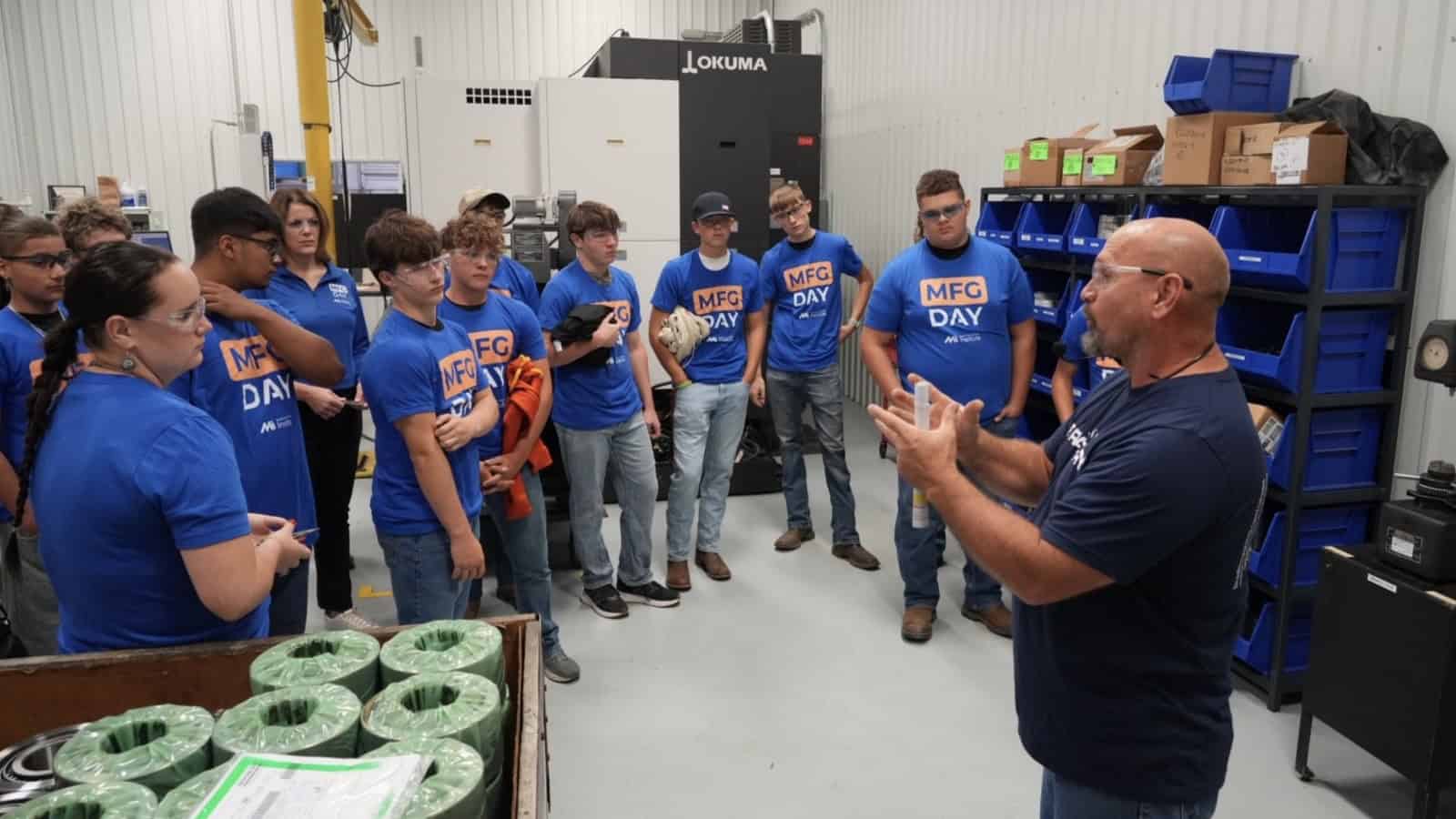
That’s another success for the books! Last week, manufacturers and their supporters nationwide celebrated MFG Day 2024, rolling out the red carpet for students, educators and jobseekers and showcasing modern manufacturing’s diverse career paths.
What’s going on: The Manufacturing Institute, the NAM’s 501(c)3 workforce development and education affiliate, was on the ground in Kansas for multiple plant tours and conversations.
Visiting Bradbury Group: On Thursday’s tour of the Bradbury Group’s plant in Moundridge, Kansas, about 400 students got a firsthand look at how roll-forming and coil-processing equipment is made.
- The company—whose CEO David Cox is an NAM board member—set up stations where attendees could learn about its many career tracks. In addition, local education and community training partners were on-site to showcase job-training initiatives.
- MI President and Executive Director Carolyn Lee participated in the events, touring Bradbury’s facility with approximately 70 students from Newton High School in Newton, Kansas.
Touring with Heroes: On Friday, Lee visited four McPherson, Kansas, manufacturing plants with participants from Heroes MAKE America, the MI initiative that makes connections between the military community and the manufacturing industry.
- The companies were piping-systems manufacturer Viega, insulation and commercial roofing maker Johns Manville, downstream equipment maker Plastics Extrusion Machinery LLC and sustainable construction materials manufacturer CertainTeed.
- At Viega on Friday, Lee spoke with local high school students viewing the facility at the same time as the HMA participants.
Focus on veterans: Friday’s events also featured a networking lunch for HMA participants, including transitioning service members, veterans and military spouses, with human resources representatives from McPherson manufacturers.
- The Bradbury Group—the parent company of four manufacturing businesses in addition to the Bradbury Company, which has participated in MFG Day for nine years—was represented at the lunch by one of its employees, a U.S. military veteran.
Made possible by: This year’s activities were made possibly by generous support from sponsors Union Pacific, Dominion Energy, Johnson & Johnson, Novonesis, UKG, the International Corrugated Packaging Foundation, Lutron Electronics Co. Inc, Winnebago Industries, Alfa Laval (US), Intertek Alchemy, the National Center for Next Generation Manufacturing and Seaway Bolt & Specials Corp.
Stay tuned: MFG Day events will continue across the U.S. throughout October and beyond. You can find the full list of registered events, and a handy map, here.
The last word: “MFG Day is the prime opportunity for manufacturers to demonstrate firsthand the vast career opportunities that exist in industry,” Lee said. “While students, parents and educators remain our primary focus, it’s also a great time to engage other career-seeking groups so that they, too, can see themselves in manufacturing.”
Heroes MAKE America Draws a Crowd
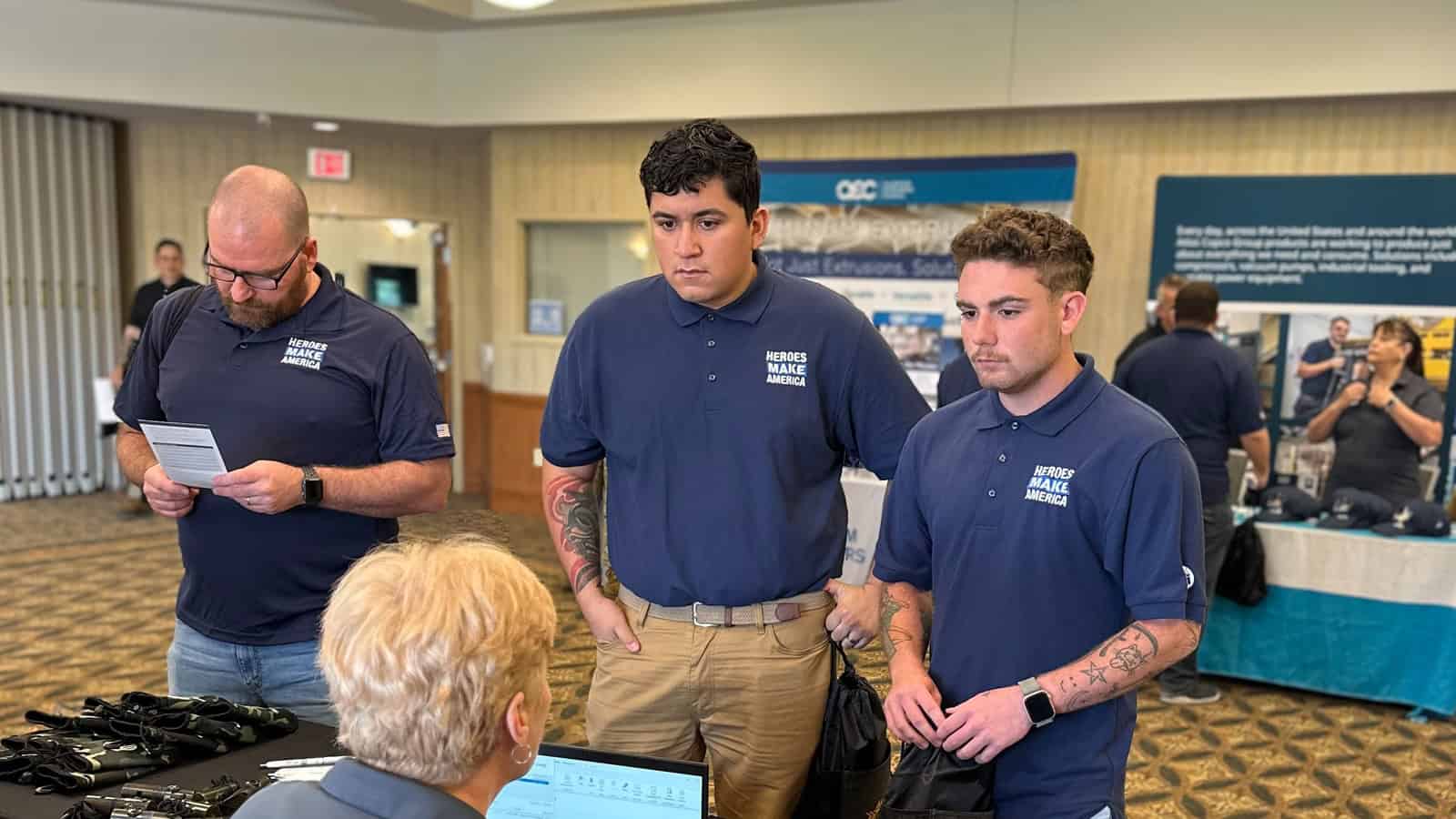
Nearly 100 veterans attended a manufacturing career fair at Fort Riley, Kansas, last week, including many who had prepared for their new careers via the Heroes MAKE America program (Kansas Biz News).
What’s going on: “The career fair and other events held by Heroes MAKE America and Manufacturing Institute [the NAM’s 501(c)3 workforce development and education affiliate] aim to grow the manufacturing industry’s workers for the advancement of modern manufacturing and offer programs, including informational sessions, career fairs, networking, career readiness, placement support and manufacturing tours.”
- More than 30 regional and national manufacturers had booths at the event.
How it helps: HMA—an MI program with a 90% graduate placement rate—offers career help to job seekers transitioning out of the military and into the civilian workforce. The aid is in the form of training and introductions to manufacturing leaders seeking employees.
- One military member who attended the fair said “she’s received help with resume writing, interviewing for jobs and how to translate military experience into tools you can use in the civilian world.”
- HMA, which hosts virtual career fairs throughout the year, also offers resources to employers. These include online training, courses and access to the research of the Society of Human Resource Management Foundation.
Why it’s important: The industry could create about 3.8 million new manufacturing jobs on net between this year and 2033, according to a new study by Deloitte and the MI.
- However, if the current manufacturing employee deficit is not shored up, approximately half of these jobs—or 1.9 million—could go unfilled.
What’s next: Interested employers can participate in an information session to be held later this month, where they can learn more about attracting, hiring and retaining military talent through upcoming career fairs and virtual hiring events.
The last word: “Members of the military community often possess valuable skills and qualities—such as discipline, teamwork, leadership and problem-solving abilities—that are in demand for manufacturing careers,” said MI President and Executive Director Carolyn Lee.
- “That’s why manufacturers are increasingly connecting with this top talent through an array of resources provided by the MI’s Heroes MAKE America initiative.”
Manufacturing Employment Stays the Same
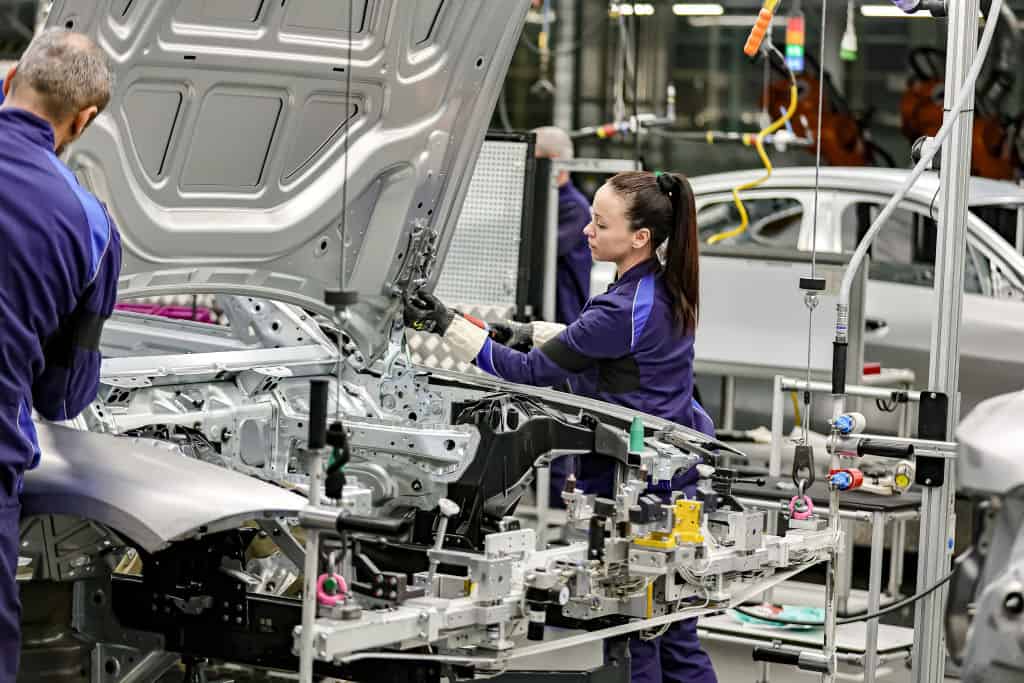
Employment in manufacturing remained essentially the same in April as it was in March, according to data out today from the U.S. Bureau of Labor Statistics.
- Overall employment increased by 175,000.
What’s going on: Manufacturing employed a seasonally adjusted 12,961,000 workers in April, up just marginally from 12,953,000 in March and 12,957,000 in February.
- The number of people employed in manufacturing was also up only slightly from April 2023, when it was a seasonally adjusted 12,941,000.
Durable goods vs. nondurable: There were a seasonally adjusted 8,144,000 workers in durable goods manufacturing in April, flat from March’s number.
- Nondurable goods had a seasonally adjusted 4,817,000 employees, also essentially unchanged from the prior month.
Workweek: The average workweek in the manufacturing industry was unchanged from March, at 40.0 hours.
- In the larger economy, the workweek for all nonfarm employees inched down by 0.1 hour in April, to 34.3 hours.
Earnings: Average earnings in manufacturing were also little changed from March to April, coming in at $33.61 an hour in the latest reading, down only slightly from $33.65, but up from February’s $33.44.
